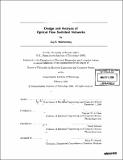Design and analysis of optical flow switched networks
Author(s)
Weichenberg, Guy E. (Guy Elli), 1978-
DownloadFull printable version (58.12Mb)
Alternative title
Optical flow switched networks
Other Contributors
Massachusetts Institute of Technology. Dept. of Electrical Engineering and Computer Science.
Advisor
Vincent W.S. Chan and Muriel Médard.
Terms of use
Metadata
Show full item recordAbstract
In the four decades since optical fiber was introduced as a communications medium, optical networking has revolutionized the telecommunications landscape. It has enabled the Internet as we know it today, and is central to the realization of Network-Centric Warfare in the defense world. Sustained exponential growth in communications bandwidth demand, however, is requiring that the nexus of innovation in optical networking continue, in order to ensure cost-effective communications in the future. In this thesis, we present Optical Flow Switching (OFS) as a key enabler of scalable future optical networks. The general idea behind OFS-agile, end-to-end, all-optical connections-is decades old, if not as old as the field of optical networking itself. However, owing to the absence of an application for it, OFS remained an underdeveloped idea-bereft of how it could be implemented, how well it would perform, and how much it would cost relative to other architectures. The contributions of this thesis are in providing partial answers to these three broad questions. With respect to implementation, we address the physical layer design of OFS in the metro-area and access, and develop sensible scheduling algorithms for OFS communication. Our performance study comprises a comparative capacity analysis for the wide-area, as well as an analytical approximation of the throughput-delay tradeoff offered by OFS for inter-MAN communication. Lastly, with regard to the economics of OFS, we employ an approximate capital expenditure model, which enables a throughput-cost comparison of OFS with other prominent candidate architectures. Our conclusions point to the fact that OFS offers significant advantage over other architectures in economic scalability. (cont.) In particular, for sufficiently heavy traffic, OFS handles large transactions at far lower cost than other optical network architectures. In light of the increasing importance of large transactions in both commercial and defense networks, we conclude that OFS may be crucial to the future viability of optical networking.
Description
Thesis (Ph. D.)--Massachusetts Institute of Technology, Dept. of Electrical Engineering and Computer Science, 2009. Includes bibliographical references (p. 253-279).
Date issued
2009Department
Massachusetts Institute of Technology. Department of Electrical Engineering and Computer SciencePublisher
Massachusetts Institute of Technology
Keywords
Electrical Engineering and Computer Science.